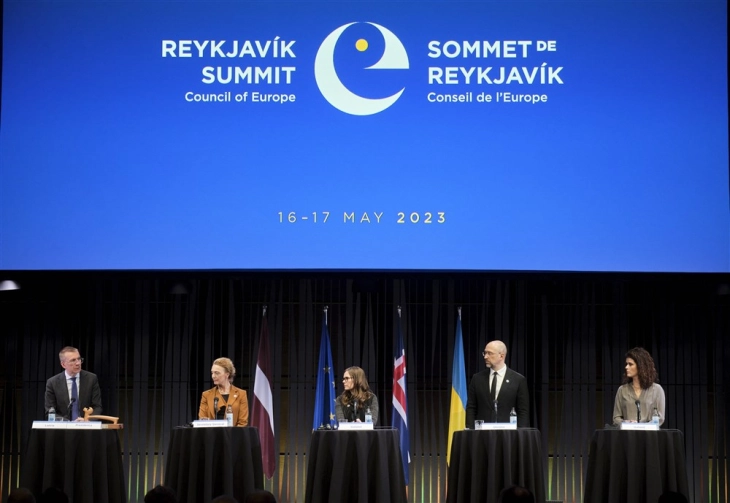Council of Europe adopts Register of Damage against Russia
- The Council of Europe has launched a Register of Damage for the devastation caused by the war in Ukraine - but not all countries are joining in. In total, 40 of the Council of Europe's 46 states have agreed to join or will do so in the future. Armenia, Azerbaijan, Bosnia-Herzegovina, Serbia, Hungary and Turkey will not join for the time being.
- Post By Nevenka Nikolik
- 19:28, 17 May, 2023

Reykjavik, 17 May 2023 (dpa/MIA) - The Council of Europe has launched a Register of Damage for the devastation caused by the war in Ukraine - but not all countries are joining in. In total, 40 of the Council of Europe's 46 states have agreed to join or will do so in the future. Armenia, Azerbaijan, Bosnia-Herzegovina, Serbia, Hungary and Turkey will not join for the time being.
The EU, Canada, Japan and the US are participating, the Council of Europe announced at its summit in Reykjavik on Wednesday. This summit took place for the first time in 18 years and was intended to show solidarity with Ukraine and to send a signal of unity towards Russia.
The Register of Damage is intended to document the destruction in Ukraine, which was attacked by Russia, in order to be able to hold Russia accountable for it.
The register is considered a first step on the way to possible compensation payments to Ukraine. The idea goes back to a United Nations resolution and is now to be implemented under the umbrella of the Council of Europe. The intention is to collect information and evidence on all damage, losses and injuries inflicted on Ukraine since the Russian attack.
The Damage Registry is to be based in The Hague in the Netherlands, but will have a field office in Ukraine. It will initially be established for a period of three years. All members and observers of the Council of Europe will be able to participate in the register, as well as other countries that request and are admitted. They are then expected to pay contributions to finance the register.
There could also be an additional instrument to make future compensation possible. A commission could be set up for this and a compensation fund, though there is no exact format for this yet. It is also unclear how such a compensation fund would have to be structured.
The idea of using confiscated Russian assets abroad for this purpose has been brought up several times. However, this is considered to be very difficult from a legal point of view.
The Secretary General of the Council of Europe, Marija Pejčinović Burić, described the decision for the register as "historic". It was one of the first legally binding instruments to hold Russia accountable for its actions.
For German Chancellor Olaf Scholz, the register is an "essential contribution to international efforts to hold Russia accountable for the consequences of its brutal actions", as he said in Reykjavik on Wednesday.
Scholz also offered €10 million ($10.8 million) in additional financial support for the Council of Europe. The sum would come on top of the mandatory fees that Berlin already pay, Scholz said in Reykjavik.
"We will strengthen the Council of Europe as the guardian of human rights, democracy and the rule of law in Europe so that it can effectively meet current and future challenges," he said.
The Council also needed support when it comes to artificial intelligence and protecting the environment, Scholz said.
The Council of Europe was founded in 1949 and is independent from the European Union. It also includes significantly more countries than the EU - almost all European countries.
Ukraine has been a member since 1995. Russia was excluded after the full-scale invasion of Ukraine. Their common neighbour Belarus is suspended and is only attending the summit as an observer.
It was only the fourth summit meeting of the group of states in its more than 70-year history. More than 30 heads of state and government took part. In addition to Scholz, French President Emmanuel Macron and British Prime Minister Rishi Sunak were also present.
Russia-friendly heads of state and government such as Serbian President Aleksandar Vucic and Hungarian Prime Minister Viktor Orban, however, did not make the trip to Iceland.
Photo: EPA







